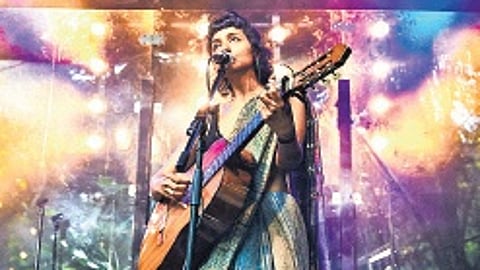

BENGALURU: When I sing parvaton ki khamoshi ko samjhon na tum buzidili (don’t mistake the silence of mountains for weakness), I’m speaking of freedom from all kinds of oppression,” says Aditi Veena, popularly known as Ditty. The Delhi-born Berlin-based artiste has made her presence known in the Indian indie music scene with her atmospheric soundscapes and haunting reflections on environmental crises and social justice.
She will be starting her multi-city Indian tour from Bengaluru this month, with her recent single, Azadi, a melancholic anthem that calls for the liberation of nature and all oppressed beings. The track is part of her upcoming album, Kaali.
Singing for change
“It’s so easy to put someone in a box and say, ‘Oh, they’re an environmentalist; it’s their problem to talk about,’ and then keep working as if these issues don’t affect you,” Ditty reflects. “I’m just engaging with my times.
I’m choosing not to always write love songs.”
Her young adult years were marked by the loss of her father to a lung disease – a painful reminder of the city’s toxic air and environmental neglect. This experience brought home the urgent realities of climate change in South Asia. “Our postcolonial reality became pretty evident,” she says. “Our cities are under so much pressure, and I didn’t want to practise mainstream architecture.”
Architectural education gave her an early understanding of how South Asian cities have inherited infrastructural struggles rooted in a colonial past, but she grew frustrated with her field’s narrow focus. “In university, if you wanted to use bamboo or build with mud, it was always considered as an alternative,” she recalls.
While working on an independent project with Nike, she was struck by the environmental cost of the fashion industry. “The clothes we wear are all dyed with chemicals so toxic you can’t put them in the ground or release them into the air without risking severe environmental harm.
In places like India, Sri Lanka, and parts of Africa, massive wells are dug specifically to bury this waste, and many European companies outsource their waste here. I thought I can’t be part of this. I started thinking about how I could reshape my life to be a better influence, and that’s when I began writing songs,” she recounts.
Her pain and observations materialised in her debut album, Poetry Ceylon. “My most famous song, Deathcab, is a love song. But I have written a lot about cities, forests and oceans,” she says. Her producer recognised the environmental themes, calling them ‘Earth songs’, which inspired Ditty to embrace her role as an environmental artist.
“There’s a song in Poetry Ceylon called Eulogy for a Sparrow, where I talk about how the sparrows went away. It’s a reference to the changing face of cities like Delhi, where pollution and urban sprawl have erased the natural world...Bengaluru, Chennai, Kochi – these cities are choking. We built over lakes and rivers, and when it rains even a little bit, cities just shut down.”
A call for freedom
Inn vadiyon ko jeene do (Let these valleys live), was the first line Ditty wrote for Azadi. “I was writing about Kashmir, but also about letting live, the idea that we are a country that came up with non-violence. I wanted to write about being peaceful to each other, to women, to children, to the elderly, to people of all castes, and to nature,” she says. Her inspiration evolved from this line into a full melody, and Azadi became her first song in Hindi.
Navigating the industry
As an independent musician, Ditty balances creative freedom, recognition, and financial stability. “The life of an independent artiste is tough, especially if you’re not constantly on tour,” she admits. Her eco-conscious lifestyle reflects her values: she buys a single round-trip ticket from Berlin to India. “I’m trying to build a rhythm where I tour in Europe in the summer and India in the winter.” This approach aligns with her environmental goals. “It’s about setting limits in sync with nature.”
Regarding the music industry and platforms like Spotify, she notes, “Spotify has been reducing payments to artistes. I have millions of views, but as an artiste, I barely see any of that revenue,” she reveals.
Ditty sees herself as an ‘artist of the times’, compelled to address these issues in her work. “It’s hard to stay motivated, especially with the numbers game. Validation today comes from metrics, which are often manipulated. But I don’t censor myself,” she says. “I won’t compromise on my art or my message.”